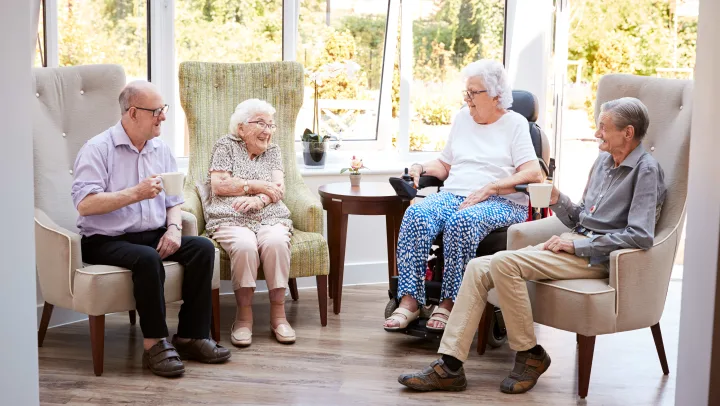Comprehending How Assisted Living Supports Clients With Dementia Care Requirements
Assisted living centers are increasingly recognized for their critical function in resolving the complex care requirements of clients with mental deterioration. By using an organized yet nurturing environment, these centers not only advertise safety and well-being but additionally foster a feeling of autonomy through personalized treatment plans.
Review of Mental Deterioration Treatment
Mental deterioration care is increasingly critical as the prevalence of dementia-related conditions increases amongst aging populations. This growing group trend necessitates a thorough understanding of mental deterioration and the various approaches to care. Mental deterioration includes a range of cognitive disabilities that disrupt life, affecting memory, reasoning, and interaction abilities. The problem can vary dramatically in its discussion, needing tailored treatment techniques to satisfy specific requirements.
Effective dementia care includes a multidisciplinary technique, incorporating medical, mental, and social support. Healthcare specialists, caretakers, and member of the family have to team up to create a nurturing environment that advertises the health of individuals with mental deterioration. Trick components of mental deterioration treatment consist of individualized treatment plans, cognitive stimulation treatments, and behavioral interventions focused on improving high quality of life.
In addition, it is important to acknowledge the emotional and psychological challenges faced by both clients and caretakers. Education and learning and training for caregivers play a pivotal duty in promoting understanding and compassion, thereby enhancing interactions with those influenced by mental deterioration. As the need for dementia treatment proceeds to rise, the focus has to stay on delivering compassionate, person-centered treatment that appreciates the dignity and preferences of individuals living with this problem.
(Dementia Care Charlotte)
Role of Assisted Living Facilities
Assisted living centers play a vital duty in giving treatment for people with dementia, offering a supportive setting that stabilizes freedom with the necessary help. These centers are designed to cater to the special demands of citizens, advertising a sense of area while making sure safety and well-being.
In an assisted living setup, experienced personnel give perpetual assistance, helping with day-to-day activities such as showering, clothing, and medication administration. This level of treatment is critical for individuals with dementia, that may battle with these jobs due to cognitive decrease. In addition, facilities commonly include memory-enhancing programs and social activities customized to stimulate cognitive performance and motivate social communication.
The physical atmosphere of assisted living centers is additionally optimized for safety and security, featuring secure entrances, well-lit paths, and clear signage to assist residents navigate their surroundings. Furthermore, these communities promote a sense of belonging, lowering the feelings of isolation that people with dementia might experience.
Personalized Treatment Plans
To make certain that each resident gets one of the most suitable treatment, customized care plans are important in nursing home for individuals with mental deterioration. These strategies are tailored to fulfill the distinct requirements, choices, and obstacles encountered by each local, promoting their self-respect and quality of life.
The advancement of a personalized care strategy typically starts with a comprehensive analysis conducted by healthcare specialists. Memory Care. This evaluation evaluates the individual's cognitive abilities, physical health and wellness, psychological health, and social choices. Input from relative and the resident themselves is vital, as it provides important insights into their background, routines, and personal passions
As soon as the evaluation is total, a multidisciplinary group collaborates to produce a treatment strategy that details details goals and interventions. This might include drug monitoring, daily living support, and behavior methods customized to alleviate stress and anxiety or agitation.
Regular evaluations and updates to the treatment plan guarantee it remains appropriate as the individual's condition advances. Memory Care. By focusing on individualized treatment, assisted living centers can enhance the general wellness of residents with mental deterioration, fostering an environment that values their originality while resolving their treatment requires effectively
Involving Tasks and Socialization
Involving activities and socialization play an essential function in enhancing the lifestyle for citizens with dementia in nursing home. These tasks are made to boost cognitive function, promote psychological well-being, and foster connections amongst homeowners. Organized programs, such as art treatment, songs sessions, and reminiscence treatment, offer chances for individuals to reveal themselves artistically while likewise activating favorable memories.
Socialization is equally crucial, as it combats feelings of isolation and loneliness that can come with dementia. Group activities, consisting of video games, group outings, and public dining, motivate communication and aid citizens develop encouraging partnerships with peers and caregivers. This sense of neighborhood not just improves their everyday experiences yet also contributes to a more secure emotional environment.
Furthermore, engaging activities can be tailored to private preferences and cognitive levels, ensuring that each citizen can participate meaningfully. By producing an environment that focuses on engagement and social interaction, helped living facilities can dramatically boost homeowners' general mental health and wellness, promoting a feeling of objective and belonging. Eventually, these initiatives are crucial parts of thorough mental deterioration treatment, significantly impacting citizens' overall health and joy.
Benefits of Community Support

Additionally, area support promotes social interaction, which is vital for cognitive and emotional health and wellness. Involving with peers and joining group tasks can boost mood and encourage reminiscence, adding to a higher sense of belonging. This social involvement is vital, as solitude and seclusion can exacerbate cognitive decrease.

(Dementia Care Charlotte)
Verdict
To conclude, helped living centers serve as important environments for people with dementia, offering organized assistance that promotes both self-reliance and security. The implementation of individualized treatment plans ensures that each homeowner's unique needs are satisfied, while involving tasks promote social interaction and cognitive interaction. The feeling of area within these centers considerably minimizes sensations of isolation, improving overall emotional wellness. Therefore, assisted living plays a necessary function in improving the lifestyle for individuals with mental deterioration.